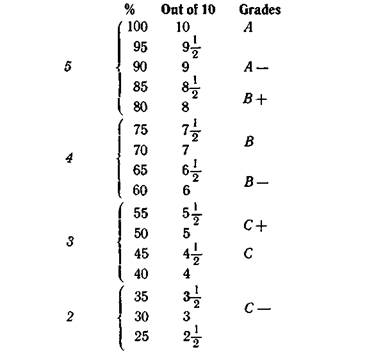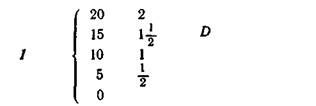
CATEGORIES:
BiologyChemistryConstructionCultureEcologyEconomyElectronicsFinanceGeographyHistoryInformaticsLawMathematicsMechanicsMedicineOtherPedagogyPhilosophyPhysicsPolicyPsychologySociologySportTourism
Soviet Marks English Marks Comments

|
| Excellent Very good Good Quite good Fair Satisfactory Rather poor Poor |

|
| Very poor |
The use of unsatisfactory depends on the minimum standard demanded in a particular case. For the variation in the pass mark in school examinations, see unit 340.
Signs and Abbreviations Used in Marking
362. Teachers in England generally use the following signs in their marking:
a tick ("îòìåòêà, ãàëî÷êà") — usually put beside each correct answer. It may seem unnecessary to put anything beside a correct answer, but it is a positive sign that the answer is correct, and has not been overlooked. It becomes a reflex action with most teachers to tick correct answers as their pen moves down the page. Then, if they are marking out of ten, they simply add up the ticks to arrive at the final mark.
A tick is also used in the case of work which is not given a mark, to show that the teacher has read it.
a cross (  ) — beside a wrong answer
) — beside a wrong answer
to cross out — something which is completely wrong, or, in some cases, something which should not be there at all.
to underline — something which is wrong, but not necessarily completely wrong. Some teachers underline definite mistakes with a straight line, and other things, which are not wrong, but not the best version, with a wavy line.
an omission mark  — if something has been
— if something has been
omitted
a question mark — if something is not clear
The following abbreviations are widely used by language teachers. They are usually put in the margin.
sp — spelling mistake st—style
gr — grammar ð—punctuation
t/T — tense
The abbreviations for the parts of speech can be found in a dictionary.
Mistakes
363. mistake/error
These words have the same meaning but differ stylistically. Mistakeis stylistically neutral, and therefore used in a wide variety of situations, whereas erroris confined to very formal style.
right/wrong, correct/incorrect
The distinction between these two pairs of opposites is also stylistic. Right/wrongare stylistically neutral, whereas correct/incorrectare formal.
364. The type of mistake can be specified in one of the fol
lowing ways:
a bad/serious mistake — ãðóáàÿ îøèáêàA very bad mistake which is also amusing may be called a howlerin colloquial speech.
e.g. David's made a howler.
a. careless mistake — îøèáêà ïî íåáðåæíîñòè
A slip has the same meaning, but is less often used.
A silly mistake
A common mistake
A typical mistake
a spelling/punctuation/pronunciation mistake, etc.
a grammar/grammatical mistake
Date: 2016-04-22; view: 922
| <== previous page | | | next page ==> |
| Class 2B or 2.2—or a lower second | | |